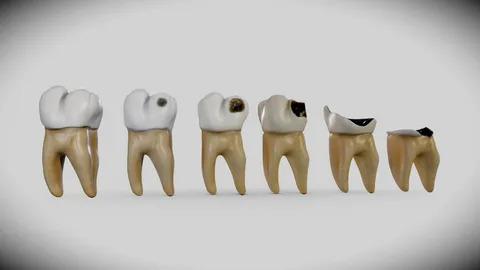Dental Caries Treatment Effective Methods to Prevent and Treat Tooth Decay

Causes of Dental Caries
One of the primary causes of dental caries or tooth decay is the presence of bacteria in the mouth such as Streptococcus mutans and Lactobacillus. When these bacteria feed on sugar and starch in foods, they produce acids. Over time, the acids eat away at the enamel on the teeth, resulting in cavities and decay. Frequently eating snacks and sweets throughout the day provides these bacteria with a continuous food supply to produce acids. In addition, some people may be more prone to cavities due to lower amounts of saliva in their mouth or genetic factors. Saliva helps neutralize acids and rinse food particles from the teeth.
Preventive Methods in Dental Caries Treatment
If you have to stay away from Dental Caries Treatment then you have to prevent dental caries from developing, it is important to practice good oral hygiene daily. This involves brushing teeth for two minutes twice a day and flossing once daily. Brushing and flossing help remove bacteria and food particles from between and around teeth. Using a fluoride toothpaste is highly recommended as fluoride strengthens the enamel on teeth and makes it more resistant to acids. Drinking fluoridated water also helps. Limiting sugary foods and drinks to mealtimes only rather than snacking on them throughout the day decreases the frequency with which acids are produced. Xylitol gum and mints also help reduce cavity-causing bacteria as xylitol starves them of their nutrient supply. Regular dental checkups every six months allow any early signs of decay to be caught promptly before it worsens.
Treatment for Early Cavities
If a cavity is detected during its early stages before it reaches the inner layers of the tooth, it can often be treated non-invasively using various methods. One approach is used of dental sealants which are thin plastic coatings painted onto the grooved and pitted surfaces of molars where food easily gets trapped. Sealants act as a barrier protecting tooth enamel. Another option is silver diamine fluoride which is a liquid applied to cavities that stops them from progressing further. It also prevents post-cavity sensitivity. For small, shallow cavities, dental composite filler material may be used to fill and repair them without needing anesthesia or drilling. These preventive treatments aim to halt the decay process in minimal ways.
Prevention of Decay Spreading to Other Teeth
When decay is extensive involving multiple tooth surfaces and adjacent teeth, further prevention and treatment methods are used. Space maintainers are placed if early childhood caries occur due to premature loss of baby teeth, to hold place for permanent teeth. They prevent adjacent teeth from shifting into the empty space and interfering with proper alignment. Dental sealants fill grooves on at-risk chewing surfaces to prevent new decay sites. Fluoride gel or varnish applications at dental visits provide added fluoride protection. Antimicrobial photodynamic therapy uses light-activated application of a non-toxic dye helping destroy cavity-causing bacteria. Pericoronitis characterized by inflammation and infection under wisdom teeth is prevented with periodic cleaning and removal of impacted teeth if needed. With a combination of several preventive strategies by the dentist, further spread of existing dental caries can be stopped.
This article discussed the various causes, preventive measures, and dental caries treatment options for dental caries at different stages from early to advanced. While daily preventive home care forms the foundation, professional dental treatments play a vital role in arresting the decay process and restoring functionality and aesthetics of affected teeth. Adopting a cavity-prevention focused approach involving education, modified diet habits, fluoride supplements.
Get more insights on Dental Caries Treatment
- Art
- Causes
- Crafts
- Dance
- Drinks
- Film
- Fitness
- Food
- Jocuri
- Gardening
- Health
- Home
- Literature
- Music
- Networking
- Alte
- Party
- Religion
- Shopping
- Sports
- Theater
- Wellness
- IT, Cloud, Software and Technology


